张保红——文学翻译共151页文档
第四章张春柏汉译英翻译词汇的技巧(上)
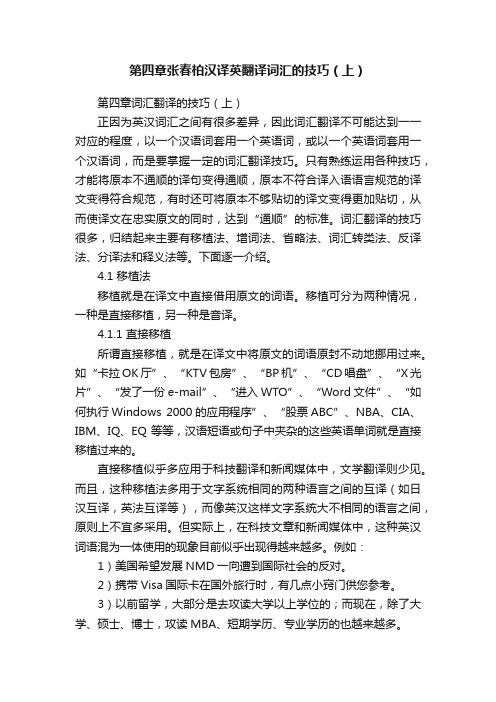
第四章张春柏汉译英翻译词汇的技巧(上)第四章词汇翻译的技巧(上)正因为英汉词汇之间有很多差异,因此词汇翻译不可能达到一一对应的程度,以一个汉语词套用一个英语词,或以一个英语词套用一个汉语词,而是要掌握一定的词汇翻译技巧。
只有熟练运用各种技巧,才能将原本不通顺的译句变得通顺,原本不符合译入语语言规范的译文变得符合规范,有时还可将原本不够贴切的译文变得更加贴切,从而使译文在忠实原文的同时,达到“通顺”的标准。
词汇翻译的技巧很多,归结起来主要有移植法、增词法、省略法、词汇转类法、反译法、分译法和释义法等。
下面逐一介绍。
4.1 移植法移植就是在译文中直接借用原文的词语。
移植可分为两种情况,一种是直接移植,另一种是音译。
4.1.1 直接移植所谓直接移植,就是在译文中将原文的词语原封不动地挪用过来。
如“卡拉OK厅”、“KTV包房”、“BP机”、“CD唱盘”、“X光片”、“发了一份e-mail”、“进入WTO”、“Word文件”、“如何执行Windows 2000的应用程序”、“股票ABC”、NBA、CIA、IBM、IQ、EQ等等,汉语短语或句子中夹杂的这些英语单词就是直接移植过来的。
直接移植似乎多应用于科技翻译和新闻媒体中,文学翻译则少见。
而且,这种移植法多用于文字系统相同的两种语言之间的互译(如日汉互译,英法互译等),而像英汉这样文字系统大不相同的语言之间,原则上不宜多采用。
但实际上,在科技文章和新闻媒体中,这种英汉词语混为一体使用的现象目前似乎出现得越来越多。
例如:1)美国希望发展NMD一向遭到国际社会的反对。
2)携带Visa国际卡在国外旅行时,有几点小窍门供您参考。
3)以前留学,大部分是去攻读大学以上学位的;而现在,除了大学、硕士、博士,攻读MBA、短期学历、专业学历的也越来越多。
4)上海飞仕娱乐有限公司坐落于徐汇区嘉善路253号,是集KTV、DISCO为一体的大型娱乐场所。
5)拥有网络规划的CAN或CNE证书、广告设计的CorelDraw Photoshop等三维或动画软件的国际证书的专业人才都是外资企业争抢的对象。
张保红文学翻译PPT课件
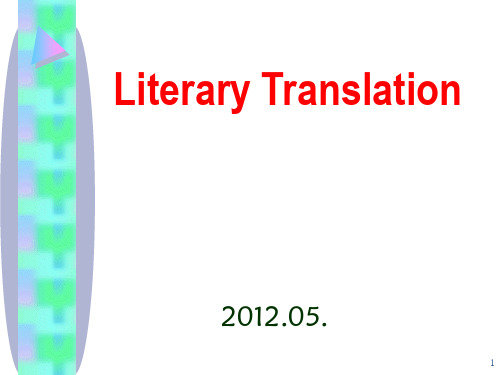
9
• 重译: • 西海的风啊, • 你轻轻地吹,轻轻地唱 • 西海的风啊, • 你轻轻地,轻轻地吹呀唱, • 越过波涛翻滚的海洋, • 掠过明月西沉的夜空,吹呀 • 再把他吹到我的身旁; • 我的小宝宝,我的乖宝宝,睡呀睡得香。
2 A Call on the Recluse Who Is Just Out
3
--- tr. Sun Dayu
3 A Hermit Visited but not Encountered
4
--- tr. Wan Changsheng & Wang Jianzhong
4 Looking for a Recluse but Failing to Find Him
11
• 译文: 一个刚从学校回来的年轻女士正 在解释。“拿一个鸡蛋,”她说, “在底部打一个孔,在顶点上打 一个相应的孔。然后把嘴唇放在 孔上,用力吸气,蛋壳里的东西 就会完全抽空了。”一个听她讲 的老妇人惊叫道:“如今的人做 事真奇怪,我作小孩的时候,他 们一头打个洞,就吸干了。”
12
• 译文: 一位刚从学校回家的女学生正在解 释:“取一枚鸡蛋,”她说,“在 蛋的底部打一个小孔,再在蛋的顶 点上打一个对应的小孔。然后将嘴 唇置于该孔之上并用力吸气,壳内 之物则尽释无遗。”一位听她讲话 的老太太嚷了起来:“如今的人做 事真叫人摸不着头脑,我作姑娘的 那阵儿,人们把蛋一头磕一个洞, 嘶溜儿一嘬就吃了。”
3 真实指涉性(真值性)VS 虚假指涉性(虚指性)
6
1. 文学语言的自指性:
英汉翻译教程张培基【完整版】
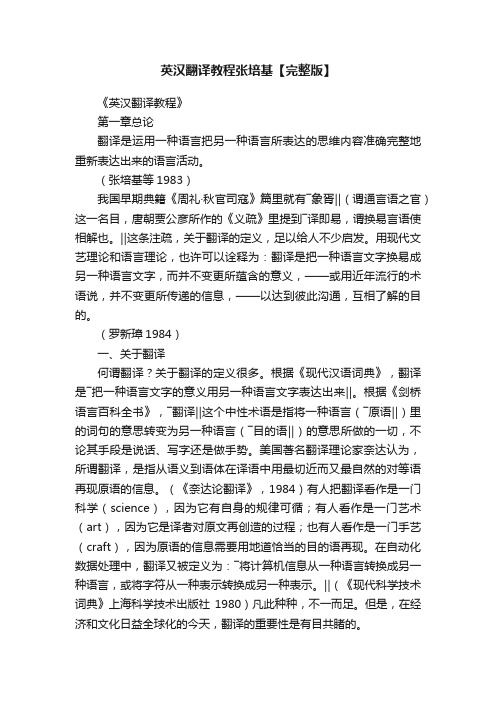
英汉翻译教程张培基【完整版】《英汉翻译教程》第一章总论翻译是运用一种语言把另一种语言所表达的思维内容准确完整地重新表达出来的语言活动。
(张培基等1983)我国早期典籍《周礼·秋官司寇》篇里就有―象胥‖(谓通言语之官)这一名目,唐朝贾公彦所作的《义疏》里提到―译即易,谓换易言语使相解也。
‖这条注疏,关于翻译的定义,足以给人不少启发。
用现代文艺理论和语言理论,也许可以诠释为:翻译是把一种语言文字换易成另一种语言文字,而并不变更所蕴含的意义,——或用近年流行的术语说,并不变更所传递的信息,——以达到彼此沟通,互相了解的目的。
(罗新璋1984)一、关于翻译何谓翻译?关于翻译的定义很多。
根据《现代汉语词典》,翻译是―把一种语言文字的意义用另一种语言文字表达出来‖。
根据《剑桥语言百科全书》,―翻译‖这个中性术语是指将一种语言(―原语‖)里的词句的意思转变为另一种语言(―目的语‖)的意思所做的一切,不论其手段是说话、写字还是做手势。
美国著名翻译理论家奈达认为,所谓翻译,是指从语义到语体在译语中用最切近而又最自然的对等语再现原语的信息。
(《奈达论翻译》,1984)有人把翻译看作是一门科学(science),因为它有自身的规律可循;有人看作是一门艺术(art),因为它是译者对原文再创造的过程;也有人看作是一门手艺(craft),因为原语的信息需要用地道恰当的目的语再现。
在自动化数据处理中,翻译又被定义为:―将计算机信息从一种语言转换成另一种语言,或将字符从一种表示转换成另一种表示。
‖(《现代科学技术词典》上海科学技术出版社1980)凡此种种,不一而足。
但是,在经济和文化日益全球化的今天,翻译的重要性是有目共睹的。
翻译是国际间理解的钥匙,据说西欧的文明归功于翻译者(据L·G·凯里1979)。
季羡林教授也说,翻译是永葆中华文明青春的万应灵药。
前中国驻联合国代表凌青先生说,从中国来讲,没有翻译工作,就没有中国***和中国近代的革命运动,就没有中国成功的对外开放和四个现代化;从世界范围来讲,没有翻译,就没有世界和平,就没有各种国际交往,就没有一个共同繁荣的美好世界的未来。
张保红文学翻译小说英译汉作业

方明明文学翻译小说英译汉从土耳其来的侄儿伊利亚斯·哈里尔著去年的一天,突然响起了敲门声。
我的侄儿没打声招呼就从土耳其来了!我上一次见他时,他才到我膝盖,像蚱蜢似的小不点儿,长了一双怯生生的眼睛,两只像一双扇子的耳朵,没了俩门牙,头发短短的,和永远脏兮兮的手。
你知道,每一个侄子基本都长这样儿。
我喜欢这孩子,对他很钟爱。
用他那小不点的身高,他总是仰脸瞅着我好似在看一根电话线杆子,他的大眼睛笑着总能把我逗乐。
从短裤里露出的两条腿有点罗圈腿。
两只眼睛虽然直视着你但有点斗鸡眼。
我看着他的时候有点怜惜他······所以我从来没有对他发过火也没有打过他。
我俩说话时,他肩膀上好似放的有重重的东西,表现出防御的样子。
他要是犯错了,这个特点会更明显。
他的眼睛渐渐湿润,声音小的都听不到;颤抖的像一片叶子。
谁看见他都会以为他是一个孤儿会为之难过。
他们就想给他点儿钱或是一些糖果。
因为一些事我打过其他的侄子,但是从来没碰过他一根手指头。
我爱他还爱不够呢!在家时,不管谁惹大人生气了,我的这个小侄儿都能让自己离得远远的。
要是你跟他说话,他就不回答。
如果他回答了也是声音小小的。
你就是打他他也是安静的。
挨打的时候,叫的声音不是越来越大,而是逐渐降低。
因此,打他的那个人怒气会变成同情,于是这小男孩就逃过了更多的惩罚。
我是很久之后才总结出来,他跟其他人说话时,既不会罗圈腿也不会斗鸡眼耳朵更不会像飞落的叶子。
还有,他生气的时候,他知道怎样吵个不停。
要是他知道危险临近(要挨打了)他就会罗圈腿、斗鸡眼、耳朵拉长。
我移民加拿大之后有十五年没见到侄儿了。
现在他已经长成魁梧的大小伙儿了,英俊健壮!表示欢迎之后,我问了他一些问题,想知道他来这里的原因。
“侄儿,你想找什么样的工作啊?”“啊,蒙主的恩准,叔叔,我愿干任何的工作。
我什么都能干。
只要说得出来我就能干。
我什么都干过。
干过木匠、电工、货郎、修鞋匠、裁缝、汽车修理工;您还要吗?这些我都干过。
张培基英译散文电子版上
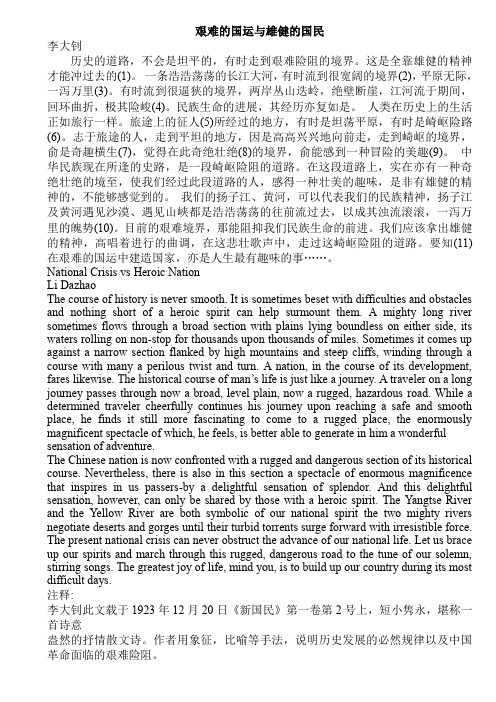
艰难的国运与雄健的国民李大钊历史的道路,不会是坦平的,有时走到艰难险阻的境界。
这是全靠雄健的精神才能冲过去的(1)。
一条浩浩荡荡的长江大河,有时流到很宽阔的境界(2),平原无际,一泻万里(3)。
有时流到很逼狭的境界,两岸丛山迭岭,绝壁断崖,江河流于期间,回环曲折,极其险峻(4)。
民族生命的进展,其经历亦复如是。
人类在历史上的生活正如旅行一样。
旅途上的征人(5)所经过的地方,有时是坦荡平原,有时是崎岖险路(6)。
志于旅途的人,走到平坦的地方,因是高高兴兴地向前走,走到崎岖的境界,俞是奇趣横生(7),觉得在此奇绝壮绝(8)的境界,俞能感到一种冒险的美趣(9)。
中华民族现在所逢的史路,是一段崎岖险阻的道路。
在这段道路上,实在亦有一种奇绝壮绝的境至,使我们经过此段道路的人,感得一种壮美的趣味,是非有雄健的精神的,不能够感觉到的。
我们的扬子江、黄河,可以代表我们的民族精神,扬子江及黄河遇见沙漠、遇见山峡都是浩浩荡荡的往前流过去,以成其浊流滚滚,一泻万里的魄势(10)。
目前的艰难境界,那能阻抑我们民族生命的前进。
我们应该拿出雄健的精神,高唱着进行的曲调,在这悲壮歌声中,走过这崎岖险阻的道路。
要知(11)在艰难的国运中建造国家,亦是人生最有趣味的事……。
National Crisis vs Heroic NationLi DazhaoThe course of history is never smooth. It is sometimes beset with difficulties and obstacles and nothing short of a heroic spirit can help surmount them. A mighty long river sometimes flows through a broad section with plains lying boundless on either side, its waters rolling on non-stop for thousands upon thousands of miles. Sometimes it comes up against a narrow section flanked by high mountains and steep cliffs, winding through a course with many a perilous twist and turn. A nation, in the course of its development, fares likewise. The historical course of man’s life is just like a journey. A traveler on a long journey passes through now a broad, level plain, now a rugged, hazardous road. While a determined traveler cheerfully continues his journey upon reaching a safe and smooth place, he finds it still more fascinating to come to a rugged place, the enormously magnificent spectacle of which, he feels, is better able to generate in him a wonderful sensation of adventure.The Chinese nation is now confronted with a rugged and dangerous section of its historical course. Nevertheless, there is also in this section a spectacle of enormous magnificence that inspires in us passers-by a delightful sensation of splendor. And this delightful sensation, however, can only be shared by those with a heroic spirit. The Yangtse River and the Yellow River are both symbolic of our national spirit the two mighty rivers negotiate deserts and gorges until their turbid torrents surge forward with irresistible force. The present national crisis can never obstruct the advance of our national life. Let us brace up our spirits and march through this rugged, dangerous road to the tune of our solemn, stirring songs. The greatest joy of life, mind you, is to build up our country during its most difficult days.注释:李大钊此文载于1923年12月20日《新国民》第一卷第2号上,短小隽永,堪称一首诗意盎然的抒情散文诗。
精编张保红——文学翻译资料

3 A Hermit Visited but not Encountered
--- tr. Wan Changsheng & Wang Jianzhong
4 Looking for a Recluse but Failing to Find Him
--- tr. Burton Watson
张驼提盒去探亲, 李驼遇见问原因, 赵驼拍手哈哈笑, 世上原来无直人。
寻隐者不遇 贾岛
松下问童子, 言师采药去。 只在此山中, 云深不知处。
标题的翻译
1 A Note Left for an Absent Recluse
--- tr. Witter Bynner
2 A Call on the Recluse Who Is Just Out
3)现象学家英伽登的“五分法”:
①字音层:字音、字形等语义与审美意义。
②意义单位:句法结构都有它的意义单元。
③图式化方面:每一所写客体都是由诸多 方面构成,在文学作品中出现时只能写 出其某些方面。
④被再现客体:文学作品中所表达的人、 物、情、事等。
⑤形而上性质层:揭示生命和存在更深的 意义,如作品中所表现出的悲剧性、戏 剧等。
• 职业道德:“就是责任心,对自己负责,对他 人负责,对艺术负责。换言之,也就是要真实, 对自己真实,对他人真实,对艺术真实。”
• 扎实的双语语言功底:具有较强的驾驭译出语 和译入语的双语能力,具有较为出色的双语写 作技能,能正确理解原文,熟练运用双语。
• 广博的文化知识:相关国家的文化背景知识 (如历史、宗教、政治、地理、军事、外交 等),中西文化差异的知识以及翻译理论与翻 译研究相关学科的知识(如语言学、哲学、文 学、美学、心理学等)。
张保红——文学翻译分析
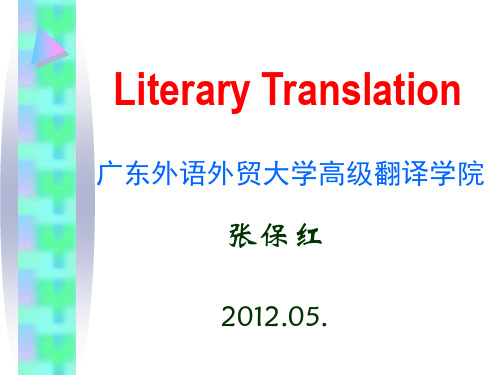
《英语世界》2012(2):4-6
• 主要内容 1 文学语言的基本特性 2 文本层次论与翻译研究 3 文学译者的素质要求 4 文学翻译的原则 5 译例演示
一 文学语言的基本特性
指义性 VS 审美性
1 外部指涉性(他指性)VS 自我指涉性(自指性)
2 直接指涉性(直指性)VS 间接指涉性(曲指性)
3 真实指涉性(真值性语言话语突出和显示自身。其表现在:
--语音:日常语言注重意思的表达,发音 是否悦耳动听,节奏是否抑扬顿挫等就 顺其自然、比较随便;文学语言关注发 音谐拗、节奏疾徐、韵律有无等。
--语法:文学语言往往会偏离日常语言语 法规范,如语序调整,词性变换等。
2.文学语言的曲指性:
采用曲折迂回手法表达意思
--原因:作者的表意策略;形象指涉的内 容具有某种不可穷尽性特点;读者想象 与回味的审美要求。
--表现:各种修辞手段或含蓄手法。
--结果:“言有尽而意无穷” “言在此而 意在彼” “不着一字,尽得风流”。
--目的:强化和深化审美效果和艺术感染 力。
三驼图(明)李士达
--- tr. Sun Dayu
3 A Hermit Visited but not Encountered
--- tr. Wan Changsheng & Wang Jianzhong
4 Looking for a Recluse but Failing to Find Him
--- tr. Burton Watson
文学翻译工作者戒 (译事十戒;译事十法) 《英语世界》2012(3):4-6
2)文学翻译由来已久,而且现在的本科翻 译专业基本上走的都是文学翻译的老路 子,……,仍然重复文学翻译的课程设 置,…… 《中国翻译》2012(1):26 (文学翻译“假想
第一章 汉英翻译概述
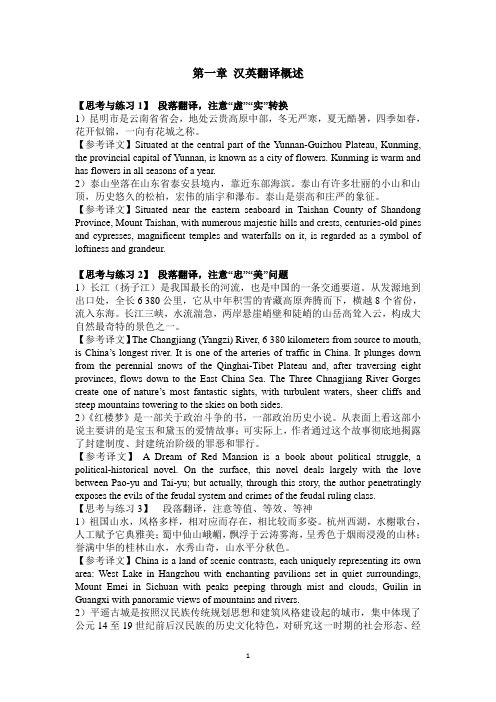
第一章汉英翻译概述【思考与练习1】段落翻译,注意“虚”“实”转换1)昆明市是云南省省会,地处云贵高原中部,冬无严寒,夏无酷暑,四季如春,花开似锦,一向有花城之称。
【参考译文】Situated at the central part of the Yunnan-Guizhou Plateau, Kunming, the provincial capital of Yunnan, is known as a city of flowers. Kunming is warm and has flowers in all seasons of a year.2)泰山坐落在山东省泰安县境内,靠近东部海滨。
泰山有许多壮丽的小山和山顶,历史悠久的松柏,宏伟的庙宇和瀑布。
泰山是崇高和庄严的象征。
【参考译文】Situated near the eastern seaboard in Taishan County of Shandong Province, Mount Taishan, with numerous majestic hills and crests, centuries-old pines and cypresses, magnificent temples and waterfalls on it, is regarded as a symbol of loftiness and grandeur.【思考与练习2】段落翻译,注意“忠”“美”问题1)长江(扬子江)是我国最长的河流,也是中国的一条交通要道。
从发源地到出口处,全长6 380公里,它从中年积雪的青藏高原奔腾而下,横越8个省份,流入东海。
长江三峡,水流湍急,两岸悬崖峭壁和陡峭的山岳高耸入云,构成大自然最奇特的景色之一。
【参考译文】The Changjiang (Yangzi) River, 6 380 kilometers from source to mouth, is China’s longest river. It is one of the arteries of traffic in China. It plunges down from the perennial snows of the Qinghai-Tibet Plateau and, after traversing eight provinces, flows down to the East China Sea. The Three Chnagjiang River Gorges create one of nature’s most fantastic sights, with turbulent waters, sheer cliffs and steep mountains towering to the skies on both sides.2)《红楼梦》是一部关于政治斗争的书,一部政治历史小说。
张培基英汉翻译教程
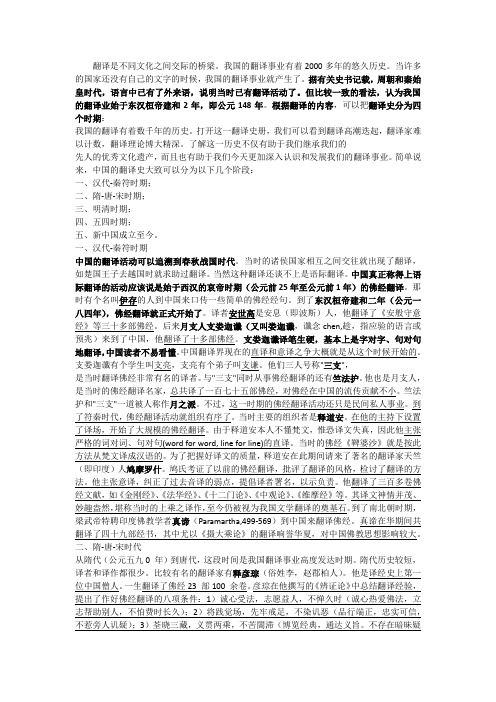
翻译是不同文化之间交际的桥梁。
我国的翻译事业有着2000多年的悠久历史。
当许多的国家还没有自己的文字的时候,我国的翻译事业就产生了。
据有关史书记载,周朝和秦始皇时代,语言中已有了外来语,说明当时已有翻译活动了。
但比较一致的看法,认为我国的翻译业始于东汉桓帝建和2年,即公元148年。
根据翻译的内容,可以把翻译史分为四个时期:我国的翻译有着数千年的历史。
打开这一翻译史册,我们可以看到翻译高潮迭起,翻译家难以计数,翻译理论博大精深。
了解这一历史不仅有助于我们继承我们的先人的优秀文化遗产,而且也有助于我们今天更加深入认识和发展我们的翻译事业。
简单说来,中国的翻译史大致可以分为以下几个阶段:一、汉代-秦符时期;二、隋-唐-宋时期;三、明清时期;四、五四时期;五、新中国成立至今。
一、汉代-秦符时期中国的翻译活动可以追溯到春秋战国时代。
当时的诸侯国家相互之间交往就出现了翻译,如楚国王子去越国时就求助过翻译。
当然这种翻译还谈不上是语际翻译。
中国真正称得上语际翻译的活动应该说是始于西汉的哀帝时期(公元前25年至公元前1年)的佛经翻译。
那时有个名叫伊存的人到中国来口传一些简单的佛经经句。
到了东汉桓帝建和二年(公元一八四年),佛经翻译就正式开始了。
译者安世高是安息(即波斯)人,他翻译了《安般守意经》等三十多部佛经。
后来月支人支娄迦谶(又叫娄迦谶,谶念chen,趁,指应验的语言或预兆)来到了中国,他翻译了十多部佛经。
支娄迦谶译笔生硬,基本上是字对字、句对句地翻译,中国读者不易看懂。
中国翻译界现在的直译和意译之争大概就是从这个时候开始的。
支娄迦谶有个学生叫支亮,支亮有个弟子叫支谦。
他们三人号称"三支",是当时翻译佛经非常有名的译者。
与"三支"同时从事佛经翻译的还有竺法护。
他也是月支人,是当时的佛经翻译名家,总共译了一百七十五部佛经,对佛经在中国的流传贡献不小。
竺法护和"三支"一道被人称作月之派。
张培基现代散文精选翻译
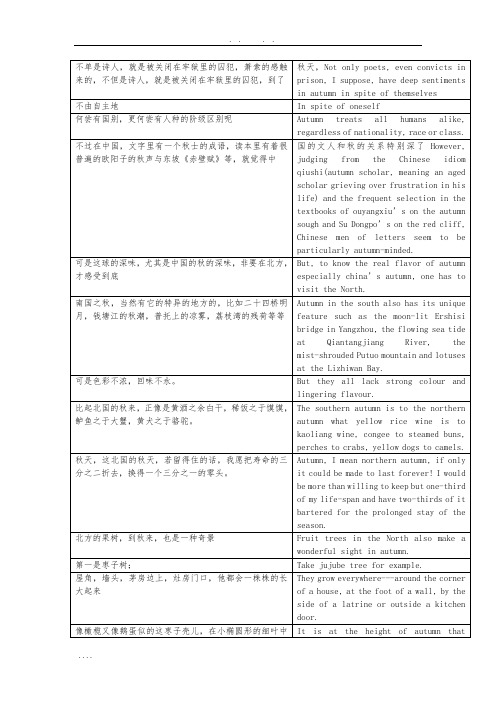
在灰沉沉的天底下,忽而来一阵凉风,便息列索的下起雨来了。
Autumn in the south also has its unique feature such as the moon-lit Ershisi bridge inYangzhou, the flowing sea tide atQiantangjiangRiver, the mist-shrouded Putuo mountain and lotuses at theLizhiwanBay.
可是这球的深味,尤其是中国的秋的深味,非要在北方,才感受到底
But, to know the real flavor of autumn especially china’s autumn, one has to visit the North.
南国之秋,当然有它的特异的地方的,比如二十四桥明月,钱塘江的秋潮,普托上的凉雾,荔枝湾的残荷等等
北方的果树,到秋来,也是一种奇景
Fruittrees in the North also make a wonderful sight in autumn.
第一是枣子树;
Take jujube tree for example.
屋角,墙头,茅房边上,灶房门口,他都会一株株的长大起来
They grow everywhere---around the corner of a house, at the foot of a wall, bytheside of a latrine or outside a kitchen door.
庞德英译_长干行_的多维艺术综合_张保红
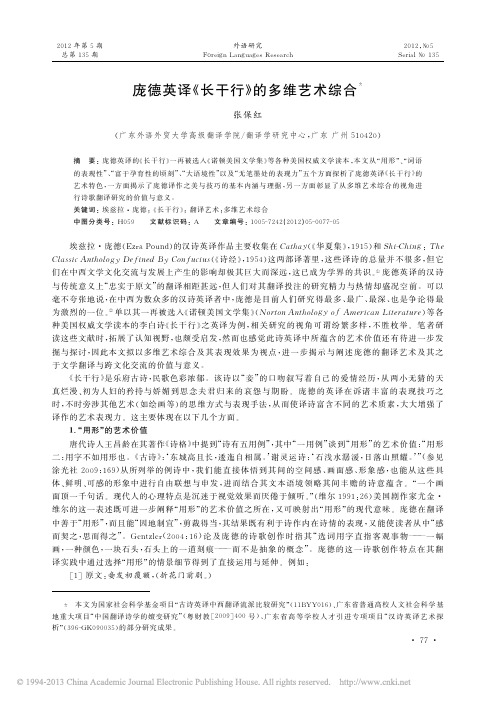
·7 7·
, 译文 : Wh i l e m h a i r w a s s t i l l c u t s t r a i h t a c r o s s m f o r e h e a d . . . y g y [ ] : ( , ) 。 2 原文 十六君远行 瞿塘滟滪堆 , 译文 : Y o u w e n t i n t o f a r K u t o e n, b t h e r i v e r o f s w i r l i n e d d i e s . . . - - y y g [ ]原文 : ( ) 早晚下三巴 , 预将书报家 。 3 , 译文 : I f o u a r e c o m i n d o w n t h r o u h t h e n a r r o w s o f t h e r i v e r K i a n . . . y g g g ] — — 齐额短发 — — — 典型而独特 , 例[ 译文中 “ 妾” 之发式 — 循着 “ 这幅画 ” 读者不难想象出 “ 妾” 之 长 相、 1 年龄 、 服饰等等 。 读此一句 , 译文读者 便 可 一 步 跨 入 汉 文 化 语 境 。 比 照 不 懂 汉 语 的 庞 德 所 依 赖 的 费 诺 罗 ) ?( 萨( 笔记中 的 译 文 “ E. F e l l o n o s a M h a i r w a s a t f i r s t c o v e r i n m b r o w s C h i n e s e m e t h o d o f w e a r i n y g y g ③ ) ”, 可以看到庞德参照了费氏的笔记 , 但却超越了费氏的 译 文 , 其“ 用 形” 的 艺 术 特 色 鲜 明, 又不失其 h a i r 定下全文内在节奏基调的功用 。 叶维廉研究了庞德的译文后指出 , 译文 “ 超越了行文的意义 , 重现了文 化 ( ) 。 例[ ] 见郭建中 2 原文 “ 瞿塘滟滪堆 ” 本指瞿塘峡口一个叫滟滪的巨石 , 因其自 古以 意义 ” 0 0 0: 3 0 6 3 0 7 2 - ” 来给行船的人们带来危险 , 令人望而生畏 。 诗中 “ 妾/ 提及此处的 用 意 在 于 担 忧 远 行 夫 君 经 过 此 处 时 的 I 人身安全 , 这一点汉语读者一望便知 , 而直接译为英文专名则西方读者恐怕未必理解其中之意。庞德作 , ( 采用 日 文 译 音 对 译 “ 瞿 塘 滟” 三字后( 庞德显然又把汉字意思搞错了) 再通过“ 用 形” 出的选择是 : t h e ” 漩涡翻滚的河水 ) 暗示出其间的凶险 , 这便从侧 面 表 现 了 “ 妾/I 内心 o f s w i r l i n e d d i e s/浪险流急 、 r i v e r g “ 的隐忧 。 此外 , 用形 ” 所形成的短语节奏 , 应和并承续着前文的节奏基 调 。 例 [ 译文通过“ 用 形” 暗示了 3] “ ) , ) 三巴 ” 的崎岖与险峻 ( 通过译句的长度也象似地 ( 表征了路途的艰 t h e n a r r o w s o f t h e r i v e r K i a n i c o n i c g 辛与遥远 。 如此一来 , 原文中专有地名背后的蕴涵在译文中被激活 , 而且与全诗融为一体 , 协调着诗 歌 律 动的情感与节奏 , 显得妥帖自然 , 诗意醇厚 。 “ 词语的表现性 ” 蕴含 2. “ 按传统的说法 , 所谓表现性 , 就是指通过人的外表和行为的某些特征 , 可以把握到人的内在 情 感 、 思 ” ( 或者 简 单 地 说 , 人 体 的 外 观 和 行 为 表 现 了 人 的 内 在 情 感 生 活。 童庆炳 2 黑格尔 想和动机 , 0 1 1: 3 1 0) ( ) “ 就表现性说得更为具体而 细 致 : 能 把 个 人 的 性 格、 思想和目的最清楚地表现出来的是动作, 1 9 7 9: 2 7 8 ” 人的最深刻方面只有通过动作才见诸现实 。 庞德的译文在选词用字上往往摒弃概念性的陈述 , 重视经 验 直感的表现 , 尤其是善于勾画人物的一言一行 、 一举一动来表现人物当时的情感 、 态度 、 心境甚至性 格 , 以 此增强译文的可视效果与生动性 , 这既是庞德英译《 长 干 行》 全 篇 的 主 导 特 色, 也是庞德意象主义诗学原 — —“ ( , “ 绝不使用无益于 表 现 的 词 ” 提倡在诗歌创作中只是呈现不加陈 则的实践和彰显 — P o u n d 1 9 6 8: 3) ” ( ) 述的方法 , 把一切陈述性和推理性的文字都剔除干净 。 朱徽 2 例如 : 0 0 1: 3 6 8 [ ]原文 :十四为君妇 , 羞颜未尝开 。 4 低头向暗壁 , 千唤不一回 。 译文 :A t f o u r t e e n I m a r r i e d M L o r d o u, y y , I n e v e r l a u h e d b e i n b a s h f u l . g g , L o w e r i n m h e a d I l o o k e d a t t h e w a l l . g y , , C a l l e d t o a t h o u s a n d t i m e s I n e v e r l o o k e d b a c k. 在这段译文中 , 庞德用了一 系 列 具 有 表 现 性 的 动 词 , 将“ 的 举 止、 仪态以及形象勾画得尤为生 I/妾 ” ” 动、 饱满 。 首行中的表现性动词 “ 暗示出 “ 表现出的主动或自愿情态 , 这样的翻 译 有 别 于 陈 m a r r i e d I/妾 ” ” 。 这也为下文一系列表现性词语的出现打下了伏 述事实信息的译文如 “ A t f o u r t e e n I b e c a m e w i f e o u r y — — —L — — —l 笔 。“ 初为人妇的矜持与娇媚通过这些行为举止 ( I/妾 ” n e v e r l a u h e d o w e r i n m h e a d o o k e d g g y — — —n ) 表现得尤为充分 。 从这组 选 词 用 字 中 , 我们还可以看到庞德使用音素 a t t h e w a l l e v e r l o o k e d b a c k ) ] , ” 构型 ( 手段 ( 音素[ 反 复 出 现) 突显了“ 妾/ 的 举 止 神 态。 也 因 为 有 着 “ 眼 神” h o n e m i c a t t e r n i n l I p p g ( ) “ /妾 ” 的参与与暗示 , 之形象显得格外鲜活 、 可爱 。 l o o k I “ 富于孕育性的顷刻 ” 之审美张力 3. “ 富于孕育性的顷刻 ” 是德国美学 家 莱 辛 在 其 著 作 《 拉 奥 孔》 中针对 故 事 画 的 创 作 特 点 提 出 的。莱 辛 ·7 8·
[工学]商务英语翻译第一章
![[工学]商务英语翻译第一章](https://img.taocdn.com/s3/m/fe493ae589eb172ded63b783.png)
鲁迅
中国现代伟大的文学家和翻译家 和新文学运动的奠基人。青年时 代受进化论思想影响。1902 年去日本留学,原学医,后从事 文艺等工作,企图用以改变国民精 神。1909年回国,先后在杭州、绍兴任教。
商务英语实质上就是商务活动与英语语
言的综合,它具有专业性、规范性、简 明性、具体性等特点,并具有以下主要 功能: 1.信息功能,即为商务活动参与者提 供信 息; 2.交际功能,即帮助商务活动参与者 进行交流和沟通; 3.祈使功能,即促使商务活动参与者 5~1976),文学家。 原名和乐,改名玉堂、语堂,笔 名毛驴。早年留学美国、德国。 1923年回国,在北京大学、北京 女子师范大学任教,支持爱国学 生运动。1936年旅居美国。1947 年任联合国教科文组织美术与文学主任。1954年任 新加坡南洋大学校长。1966年定居台北。《生活的 艺术》、《吾国与吾民》。
商务英语翻译的最高标准是“功能对等”,即经过
翻译,译文与原文之间在信息内容、信息承载方式、 交际目的(预期功能)和交际效果等方面最大限度地 保持不变,这样的翻译就称得上“功能对等”。为 此,译文必须做到“忠实、得体和统一”。“忠实” 是“功能对等”的必要条件,“得体”和“统一” 是“功能对等”的充分条件。
当今世界国际交流日益频繁,科技发 展日新月异,对翻译的需求越来越大。 据估计,我国目前从事翻译的人多达 100 万左右;人口仅520万的丹麦,从事翻译 工作的竟有一万人之众; 因特网上,每 天需要翻译的文字,多达130万页;而这 个数字还在增加。翻译的重要性由此可 见一斑。
张保红文学翻译作业6(小说EC)-原文

Nephew from TurkeyIlyas HalilOne day last year, there was a sudden knock on the door. Without warning, my nephew had arrived from Turkey! When I had last seen him, he was knee-high to a grasshopper, with timid eyes, ears like two fans, two front teeth missing, short hair and continually dirty hands. You know, the look that fits every nephew. I liked and was closely attached to him. With that knee-high-to-a-grasshopper size, he used to look up at me as if viewing a telephone pole, his amber eyes smiling and secretly making fun of me. The legs sticking out of his short pants were a little crooked. Though his eyes were straight, he appeared a bit cross-eyed. I felt sorry when I looked at him…and I never got angry with him or hit him. When we talked, he seemed to have a weight on his shoulders and appeared offended. When he was guilty, this attribute definitely worsened. His eyes grew moist and his voice softened to where he could hardly be heard; it trembled like a leaf. Those who saw him, thought him an orphan and felt sorry. They felt like putting their hands in their pockets and giving him some spending money or candy. In spite of my hitting my other nephews for any old thing, this one I cou ldn‟t touch. I loved the little son of a gun!At home, no matter who got angry, our nephew managed to keep his distance. If you spoke to him, he didn‟t reply. If he did answer, it was quietly. Even if you hit him, he was quiet. When taking a beating, instead of increasing, his wailing decreased. Thus, the anger of who ever was beating him turned to compassion and the boy was saved from further punishment. Only much later did I come to this conclusion. When talking with others I observed that our lad had neither crooked legs, cross-eyes nor big ears hanging like fig leaves. Furthermore, when he got mad, he knew how to yell his head off. It was only when he detected danger that his legs went crooked, his ears grew and his eyes crossed.I hadn‟t seen my nephew for the fifteen years since I had emigrated to Canada. He had become a strapping young man, handsome and strong! After bidding him welcome, I asked a few questions about what he planned to do.“What job will you take, Nephew?‟“Golly, Uncle, I‟ll do any jo b there is. Nothing will get away fro m me. Just say it, I‟ll do it.I‟ve done everything! I‟ve been a carpenter, electrician, peddler, shoemaker, tailor, auto mechanic; you want more? I‟ve been all of these!”“Too bad! So you didn‟t get the chance to go to college?”“What kind of talk is that, Uncle! I finished law school.”“Very well, my boy, but how did you find time to do all these things? You‟re only twenty-three years old! How did you manage all these jobs and still go to college?”“Uncle, don‟t worry about the details! Just eat the grapes and don‟t ask about the vineyard! If you don‟t believe me, show me a broken electric sewing machine, radio, electric shaver or a juicer and I‟ll repair it. You can‟t tell a suit I‟ve reversed the cloth on from a new o ne. If I turn that handkerchief pocket over it will look real sharp! It‟s not hard to sell old clothes for new! If it‟s food you want, let me cook for you today! See if what I cook isn‟t so delicious you can‟t eat enough of it? The flavor will stay on your palate a hundred years! There‟s nothing I don‟t know, Uncle!”I saw that our boy certainly had learned “to shoot the bull.” I‟ve heard of all types but never one like this. The boy was a walking trades guild! Furthermore, he had studied law! Be logical, I thought to myself. If a person spent two years learning each job, it would take fifty years to learn all these professions. “Something‟s rotten in Denmark.” It‟ll probably surface later!“What job can you get here? Forget law for now. The source of Canadi an law is not Roman law. Napoleonic Civil Law isn‟t in effect here, either, ” I told him.“Napoleonic Law? What‟s that? We didn‟t study such law.”“You mean you don‟t know who Napoleon was?”“No,” replied our nephew.“So-o-o, what kind of history did you s tudy?‟“Ordinary history, Uncle! Only we didn‟t have a history teacher. A captain came to our class, a history buff from the nearby regiment. He gave us lots of lessons on soldiering and the repair of weapons. Because of him, I became a Number One gunsmith. Bring whatever you want! Blindfolded, I can take apart a machine gun and assemble it again, I can even repair heavy tanks. If you want, I‟ll make you a pistol form a water pipe! I know lots about weapons. Our captain used to say, “After you know weapons,you make history yourself. There‟s no need to learn history someone else has made!” I don‟t know who defeated whom in battle nor what year. What do I care?Would that make me powerful? It‟s hot air! Nah! If this right arm is strong, OK, forget the rest!”“Very well, Nephew! Tomorrow, let‟s go to the capital and register you at the embassy.”“Are we going to Washington, Uncle?”“Come on, is Washington the capital of Canada?Who taught you geography, my boy?”“O-hoh, Uncle, look at the question you asked. Gee, in a lifetime, who is going to ask me the capital of Canada? Instead of that, I learned more useful things! If your coat gets torn today will knowledge about Canada save you expense? Or is knowledge of sewing needed? Tell me, Uncle! The things our geogr aphy teacher taught us are always useful. After our school‟s geography teacher, Omer Temel, left to open a grocery store, the town tailor, Kasim Effendi, who knew how to read and write, came to teach the geography class. He taught us for six years. We learned a lot! Every year, we turned the cloth on two suits of clothes. We patched and learned to press! We learned how to sew trousers. Our teacher said, “Learn this and in life you‟ll never go hungry. Instead of memorizing the names of infidel foreign cities, or learning their rivers, learn something useful! What‟s that knowledge good for except to climb mountains and tear up your shoes? For what God-awful reason do you learn the population of Berlin or London? Doesn‟t the number change every year? Not only every year, it changes every day, every hour! Thousands of people die, are born, come and go…Don‟t those geographers have any brains? They never get tired of giving false figures to the students.”“Tailor Kasim Effendi used to say, “Now see! Look at Haydar,the literature teacher‟s house, then mine! Tell me now, whose knowledge is the most useful? Haydar Bey writes poetry, but he‟s hungry; so what‟s the use of this knowledge? Come and see whose knowledge provides more bread, butter and honey. Come and see who lives more comfortably. Pay attention to what I say! Learn what I show you and you won‟t eat bread without butter and honey!”I listened to my nephew in amazement. What he said was probably true. I compared my situation with his. There was a chasm between us! I was a graduate history teacher, fifty-three years old. For the past fifteen years I‟ve continued at the university every winter learning new things. Every year, I realize how far behind I am! In spite of this, in the same place, like a donkey‟s tail, I teach on and on, hoping for better things! With this way of life it seems I‟m getting nowhere.“Very well, my boy, how‟s your mathematics?” I asked.“Hot as a pistol, Uncle. Not a thing wrong with it! We learned mathematics fr om its origin. Ther e was no one better than our teacher. If you searched all of Turkey, you truly couldn‟t find a better teacher. Mison came to us for math. He was the accountant for a big institution. He taught us how to count money, put the excess in the safe and to bargain.“He impressed on us the fine points of addition and subtraction. For example: when buying a product, addition is one thing when selling, something else. It‟s the same with subtraction! Not everyone knows these fine points. Mison is a man who gives the government the run-around. He prepares tax returns every year and it‟s impossible to find a mistake in them. The government offered him thousands of lira: …Come and be our Minister of Finance!‟He didn‟t accept. …I‟m just a servant to free principles!‟ he replied. Truly, he was a modest man. It‟s too bad we couldn‟t learn multiplication and division form him. But never mind, I‟ll handle the situation with addition and subtraction. Thank God, I haven‟t been cheated yet.”“All right, son, didn‟t you have diff iculty in college with such a two-bit education?‟“What difficulty, Uncle? The teachers had the difficulty from us. It was really easy for us. At this time I learned auto repair. In the second year of law, our professor of International Law was sick and di dn‟t come to class the whole year. During those class periods, I went to the garage across from the university and worked. I did auto repairs. American tourists used to bring their cars to the garage. So I learned foreign money and exchange in addition to improving my knowledge of English. That year I earned as much as a professor.”I was becoming more and more interested. This was a philosophy of education unfamiliar to me. They were educating students in an atmosphere conforming to the goings-on in the world.“OK, son, what did you learn carpentry in place of?‟“I didn‟t learn it in place of anything, Uncle! When our professor of Civil Law suddenly died at the beginning of the school year, I worked at a carpentry shop to fill my spare time. Uncle, I have no regrets that I learned this. I built our house. Foundation, walls, ceiling, furniture----I made everything. Too bad I didn‟t stay there longer.“Six months later, a teacher came to our college of Medicine, a specialist in internal medicine. From him, I p icked up many facts related to civil law. He‟d been in the College of Medicine when one of his teachers died; a professor of Civil Law then came to teach them. So that‟s how he learned a great deal about law. That year he also increased our knowledge of health. If someonegets sick at home, I understand their condition, more or less. I know how to administer aspirin and quinine. Working on cruise ships, I measured blood pressure for two seasons and made lots of money. I was just about to become a doctor!”M y nephew‟s treasury of knowledge knew no bounds. He had learned something about everything. In Canada, he worked on and off… He couldn‟t hold a job anywhere. Everything he did was third-rate, so they gave him the gate. One day, we found that he‟d packed up his stuff and returned to Turkey. According to our latest news, in one year the boy became a millionaire.We correspond. In every letter he says, “Work hard on your university courses, Ha!”The Lemon LadyKatitiWe called her the "Lemon Lady" because of the sour-puss face she always presented to the public and because she grew the finest lemons we had ever seen, on two huge trees in her front garden. We often wondered why she looked so sour and how she grew such lemons ----but we could find out nothing about her. She was an old lady----at least 70 years of age, at a guess, perhaps more.One day we answered an advertisement for a flat to rent, as we had been asked to leave ours as soon as we could, and when we went to the address given, it was the house of the Lemon Lady.She didn't "unfreeze" during the whole of our interview. She said the flat would not be ready for occupation for about a month; that she had 45 names on her list and might add more before it was ready and then she would just select the people to suit her best. She was not antagonistic, just firm and austere, and I gathered that we were not likely to be the ones selected.As my husband and I were leaving, I said, "How do you grow those wonderful lemons?" She gave a wintry smile, which transformed her whole expression and made her look sweet and somehow pitiful."I do grow nice lemons," she replied. We went on to tell her how much we had always admired them every time we had passed, and she opened up and told us quite a lot about this fruit.“You know the general theory of pruning, I suppose?" She asked."Oh," said my husband, "I understand about pruning fruit trees and roses, but you must not prune lemons, or so I understand." He added these last words when he saw from the Lemon Lady's expression that he had said the wrong thing."No," said the Lemon Lady, "you must not prune lemons unless you want them to grow like mine. What is the reason for pruning?""Well, to cut off dead or diseased wood; to prevent one branch chafing another; to let the sunlight into the center of the bush and to promote the growth of the more virile buds.""Very nicely put," said the Lemon Lady. "And why do you think that lemons are better with dead or diseased wood on them; why should you not let sunlight into them; why should allowing many sickly buds to develop make it a healthier tree?""I hadn't thought about it at all," confessed my husband rather shame-facedly, as he prides himself on being an original thinker, and here he was allowing an old lady to out-think him. "Everyone here said you mustn't prune lemons, so I thought it must be right."We thanked her for the information and left, on much better terms with her than we would have ever thought possible. We even felt quite a degree of affection towards her.In the course of the next three weeks we saw several places that might have been to let but which for various reasons we could not get. Eventually we got a place that suited us very well and I returned to tell the Lemon Lady that we would not be needing her flat.She was very nice and gave me afternoon tea. She said in her precise and careful style, "I'm glad you have a house for your own sake and for the sake of your little boy, because a flat is no place for a child, especially a boy. But for my own sake, I'm very sorry. I had decided to let you have the flat because I think we could have got on very well together and because you liked my lemons."As I left, she handed me a bag with two huge lemons in it. They were the most magnificent I have ever seen----huge and without blemish, and two were all the load I would care to carry. As I looked back from the gate and saw her sweet smile, I wondered why we had called her the Lemon Lady.As my husband said to me afterwards, "No one could do anything so well as she grew those lemons, without being very proud of the accomplishment, and our touching on them was a goodpoint in psychology." We have used that idea to good effect several times since then.At the house we did rent was a decayed, dying old lemon tree with the woodlice playing havoc with the remnant of its body. My husband shook his head sadly as he gazed at it. "Too late for treatment, I'm afraid," he said, but he set to and pruned it ruthlessly. We were in that house for four years and from the second year onward, we each had the juice of a lemon every morning, and when we left we took with us two 60-pound cases of lemons from the tree, and after we left a friend wrote and asked why we had not picked the lemons before we left.We still call her the Lemon Lady, but the term is now one of pure affection.Hate(Excerpt)Hendrik Willem Van LoonSuddenly the war was over, and Hitler was captured and brought to Amsterdam. A military tribunal condemned him to death. But how should he die? To shoot or hang him seemed too quick, too merciful. Then someone uttered what was in everybody's mind: the man who had caused such incredible suffering should be burned to death."But," objected one judge, "our biggest public square in Amsterdam holds only 10,000 people, and 7,000,000 Dutch men, women and children will want to be there to curse him during his dying moments."Then another judge had an idea. Hitler should be burned at the stake, but the wood was to be ignited by the explosion of a handful of gunpowder set off by a long fuse which should start in Rotterdam and follow the main road to Amsterdam by way of Delft, The Hague, Leiden and Haarlem. Thus millions of people crowding the wide avenues which connect those cities could watch the fuse burn its way northward to Herr Hitler's funeral pyre.A plebiscite was taken as to whether this was a fitting punishment. There was 4,981,076 yeas and one nay. The nay was voted by a man who preferred that Hitler be pulled to pieces by four horses.At last the great day came. The ceremony commenced at four o'clock on a June morning. The mother of three sons who had been shot by the Nazis for an act of sabotage they did not commit set fire to the fuse while a choir sang a solemn hymn of gratitude. Then the people burst forth into a shout of triumph.The spark slowly made its way from Rotterdam to Delft, and on toward the great square in Amsterdam. People had come from every part of the country. Special seats had been provided for the aged and the lame and the relatives of murdered hostage.Hitler, clad in a long yellow shirt, had been chained to the stake. He preserved a stoical silence until a little boy climbed upon the pile of wood surrounding the former Fuhrer and placed there a placard which read, "This is the world's greatest murderer." This so aggravated Hitler's pent-up feelings that he burst into one of his old harangues.The crowd gaped, for it was a grotesque sight to see this little man ranting away just as if he were addressing his followers. Then a terrific howl of derision silenced him.Now came the great moment of the day. About three o'clock in the afternoon the spark reached the outskirts of Amsterdam. Suddenly there was a roll of drums. Then, with an emotion such as they had never experienced before, the people sang the Wilhelmus, the national anthem. Hitler, now ashen-gray, futilely strained at his chains.When the Wilhelmus came to an end, the spark was only a few feet from the gunpowder; five more minutes, Hitler would die a horrible death. The crowd broke forth to a shout of hate. A minute went by. Another minute. Silence returned. Now the fuse had only a few inches to go. And at that moment the incredible happened.A wizened little man wriggled through the line of soldiers standing guard. Everybody knew who he was. Two of his sons had been machine-gunned to death by parachute troops; his wife and three daughters had perished in Rotterdam's holocaust. Since then, the poor fellow had seemed deprived of reason, wandering aimlessly about and supported by public charity—an object of universal pity.But what he did now made the crowd turn white with anger. For he deliberately stamped upon the fuse and put it out."Kill him! Kill him!" the mob shouted. But the old man quietly faced the menacing populace. Slowly he lifted both arms toward heaven. Then in a voice charged with fury, he said:"Now let us do it all over again!"因为有了那个信箱林荣芝近来小镇治安有点乱。
文学英语翻译张培基英译散文哭
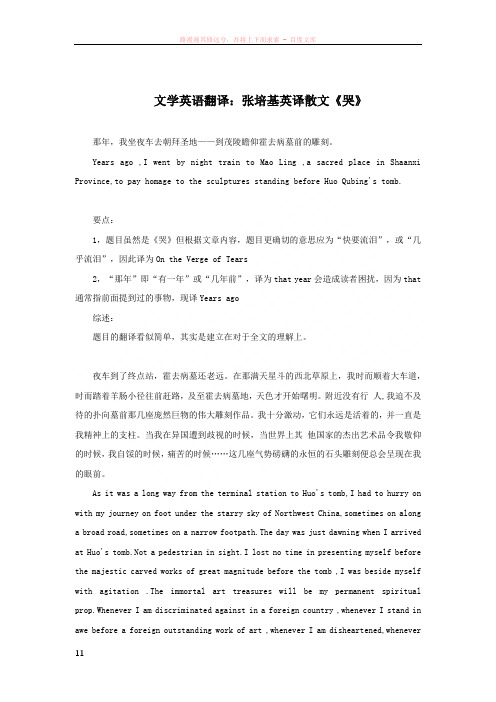
文学英语翻译:张培基英译散文《哭》那年,我坐夜车去朝拜圣地——到茂陵瞻仰霍去病墓前的雕刻。
Years ago ,I went by night train to Mao Ling ,a sacred place in Shaanxi Province,to pay homage to the sculptures standing before Huo Qubing's tomb.要点:1,题目虽然是《哭》但根据文章内容,题目更确切的意思应为“快要流泪”,或“几乎流泪”,因此译为On the Verge of Tears2,“那年”即“有一年”或“几年前”,译为that year会造成读者困扰,因为that 通常指前面提到过的事物,现译Years ago综述:题目的翻译看似简单,其实是建立在对于全文的理解上。
夜车到了终点站,霍去病墓还老远。
在那满天星斗的西北草原上,我时而顺着大车道,时而踏着羊肠小径往前赶路,及至霍去病墓地,天色才开始曙明。
附近没有行人,我迫不及待的扑向墓前那几座庞然巨物的伟大雕刻作品。
我十分激动,它们永远是活着的,并一直是我精神上的支柱。
当我在异国遭到歧视的时候,当世界上其他国家的杰出艺术品令我敬仰的时候,我自馁的时候,痛苦的时候……这几座气势磅礴的永恒的石头雕刻便总会呈现在我的眼前。
As it was a long way from the terminal station to Huo's tomb,I had to hurry on with my journey on foot under the starry sky of Northwest China,sometimes on along a broad road,sometimes on a narrow footpath.The day was just dawning when I arrived at Huo's tomb.Not a pedestrian in sight.I lost no time in presenting myself before the majestic carved works of great magnitude before the tomb ,I was beside myself with agitation .The immortal art treasures will be my permanent spiritual prop.Whenever I am discriminated against in a foreign country ,whenever I stand in awe before a foreign outstanding work of art ,whenever I am disheartened,wheneverI suffer agony … these imperishable stone carvings of amazing grandeur will inevitably appear in my minds eye.要点:1,“夜车到了终点站,霍去病墓还老远。
张春柏 汉译英 附录二 短文翻译练习

附录二:短文翻译练习英译汉:1. The History of April Fools’ DayHow do you think April Fools’ Day originated?Was there a historic epidemic of spring fever-tomfoolery in a tiny Finnish town in the early 1800s? Did a New Yorker in 1910 find a cockroach in his coffee cup and decide to recreate the experience for his officemate, thereby sparking a famous April 1st lawsuit?In a convincing testimonial to the saying that truth is stranger than fiction, we’ll tell you the story, or at least present the most viable theory of how April Fools’ Day came to be.Once upon a time, back in 16th-century France, before computers, people celebrated New Year’s Day on March25, the advent of spring. It was a festive time. They partied steadily until April 1. In1564, when the calendar reformed and became Gregorian(格里高利历,即阳历), King Charles IX proclaimed, perhaps pompously, that New Year’s Day should be celebrated on January 1 instead of in the spring. Diehard conservatives resisted the change (or perhaps didn’t hear about it due to the absence of e-mail) and continued to celebrate New Year’s from March 25 to April 1. During this period of spring festivity, the more flexible French mocked the rigid revelers by sending them foolish gifts and invitations to non-existent parties. The victim of an April Fools’ Day prank was called a “poisson d’avril2”, or an “April fish”, because at that time of year, the sun was leaving the zodiacal sign of Pisces(双鱼座).April Fools’ Day hit its stride in England in the 18th century, and was brought to colonial America by the English, Scottish, and French.......We may never learn the true origin of April Fools Day. However, the deeper question facing us today is, “What’s the best gag I can pull off?”42. The SphinxLaius, king of Thebes, was warned by an oracle that there was danger to his throne and life if his new-born son should be suffered to grow up. He therefore committed the child to the care of a herdsman with orders to destroy him; but the herdsman, moved with pity, yet not daring entirely to disobey, tied up the child by the feet and left him hanging to the branch of a tree. In this condition the infant was found by a peasant, who carried him to his master and mistress, by whom he was adopted and called Oedipus, or Swollen-foot.Many years afterwards Laius being on his way to Delphi, accompanied only by one attendant, met in a narrow road a young man also driving in a chariot. On his refusal to leave the may at their command the attendant killed one of his horses, and the stranger, filled with rage, slew both Laius and his attendant. The young man was Oedipus who thus unknowingly became the slayer of his own father.Shortly after this event the city of Thebes was afflicted with a monster which infested the highroad. It was called the Sphinx. It had the body of a lion and the upper part of a woman. It lay crouched on the top of a rock, and arrested all travelers who came that way, proposing to them a riddle, with the condition that those who could solve it should pass safe, but those who failed should be killed, Not one had yet succeeded in solving it, and all had been slain. Oedipus was not daunted by these alarming accounts, but boldly advanced to the trial. The Sphinx asked him, “What animal is that which in the morning goes on four feet, at noon on two, and in the evening upon three?” Oedipus replied, “Man, who in childhood creeps on hands and knees, in manhood walks erect, and in old age with the aid of a staff.” The Sphinx was so mortified at the solving of her riddle that she cast herself down from the rock and perished.The gratitude of the people for their deliverance was so great that they made Oedipus their king, giving him in marriage their queen Jocasta. Oedipus, ignorant of his parentage, had already become the slayer of his father; in marrying the queen he became the husband of his mother. These horrors remained undiscovered, till at length Thebes was afflicted with famine and pestilence, and the oracle being consulted, the double crime of Oedipus came to light. Jocasta put an end to her own life, and Oedipus, seized with madness, tore out his eyes and wandered away from Thebes, dreaded and abandoned by all except his daughters, who faithfully adhered to him, till after a tedious period of miserable wandering he found the termination of his wretched life.3. My FatherMy father lived in a small wooden house in western Canada, where he carved himself out a fruit orchard from the hillside and the forest. He had chosen it with one of the most beautiful view in the world, an open valley and a river winding, with mountains beyond, and the Kootenay lake just visible in the north and built himself a wide window, to look out on three sides. This window, and six Chippendale chairs which he had rescued in a farmer’s sale, and a few of his sketches on the walls, were all the luxury of the place. I spent two winters with him, and once brought him a pot of primulas while the snow still lay heavy all around; but he soon took occasion to say casually that he was not fond of forced plants: they took away something for him of the first rapture of the spring. His loves were very deep and gentle; they seemed not to be centered in islands of possession, like most human loves, but to be diffused among people and animals and plants, and even the shapes of things he saw; for he was a most sensitive artist. He lived among flowers and was first in his valley to send for bulbs from Holland and to fill his orchard with daffodils under the flowering trees. He was a good rider and a great walker and fond of the woodsmen and the hunters, and those who spend half the year away from their fellow men visiting traps in the mountain forests.Four years before his death, when he was seventy-two, a stroke took away from him the open-air life he loved; and though by the strength of his will he managed, step by step with the passing months, to walk a mile or so with a stick to lean on, most of his time came to be spent in the windows that looked out on his view. Here, he told me, the changing clouds and the light of the river would fill his mind withpleasantness for hours at a time and lead his thoughts into endless variation: and I believe this to be true, and that he was happy, for not only did he never complain, but his whole atmosphere was one of serenity and peaceful interest in all things as they came. And later, when I have thought of happiness and what it may be, I have always seen his gentle old head in the window, with the hillside full of tame pheasants and pigeons, and the valley and the mountains beyond, and have felt that the secret must have something in it of those older worlds which were as real to him as ours.4. Cultural Conflict“International communication” is communication between members of different cultures. This definition is simple. But the process is complex. Intercultural communication involves differing perceptions, attitudes, and interpretations. We know that even two people from the same culture can have communication problems. People can intentionally hurt each other by something they say or do. Isn’t it logical, then, that communication problems can be compounded among people who do not have the benefit of shared experiences (i.e. language and culture)?Cultures do not communicate; individuals do. Everyone has a unique style of communication. But cultures determine a general style for their members. The relationship of the individual to his culture is analogous to an actor and his director. The actor puts his own personality into his acting but is nevertheless influenced by the director. We are not always aware of the subtle influences of our culture. Likewise, we may not perceive that others are influenced by their cultures as well.Problems and misinterpretations do not result every time members from two cultures communicate. However, when cultural conflicts do arise, they may be perceived as personal rather than cultural. In the following example it is a cultural misunderstanding that creates negative feelings and confusion:A young woman from one culture is looking out of the window and sees a male acquaintance from another culture. He signals to her by puckering his lips. She quickly looks away from the window. Later she ignores him. He is confused and she is angry.The misunderstanding was due to the woman’s failure to understand the man’s nonverbal signal. In her culture, his gesture conveys a sexual advance. According to his culture, he was only saying (nonverbally), “Oh, there you are. I’ve been looking for you.” The woman’s misinterpretation resulted in her angry reaction and his confusion. If the two had known more about each other’s nonverbal cues, they could have avoided the cultural conflict.Some misunderstandings are insignificant and can be easily ignored or remedied. Other conflicts are more serious in that they can cause misunderstandings and create persistent negative attitudes toward foreigners.Difficulties in intercultural communication arise when there is little or no awareness of divergent cultural values and beliefs. In cross-cultural interaction, speakers sometimes assume that what they believe is right, because they have grown up thinking their way is the best. This ethnocentric assumption can result in negative judgments about other cultures. Another manifestation of ethnocentric attitudes is that people become critical of individuals from different cultures.Sometimes negative reactions do not result from actual interaction but rather from the fixed, preconceived beliefs we have about other people. These over-generalized beliefs or “stereotypes” frequently shape people’s perceptions of each other.Stereotypes originate and develop from numerous sources such as jokes, textbooks, movies, and television. Movies about cowboys and Indians portray cowboys as “civilized” and Indians as wild and “primitive.” A child who knows about the American Indian only through watching these movies will have a distorted and false image of this group of people. Stereotypes perpetuate inaccuracies about religious, racial, and cultural groups.Stereotyped beliefs prevent us from seeing people as individuals with unique characteristics. Negative stereotypes lead to prejudice, suspicion, intolerance, or hatred of other cultural groups.Cultural conflicts occur as a result of misinterpretations, ethnocentrism, stereotypes, and prejudice. Preventing these conflicts is possible with increased awareness of our own attitudes as well as sensitivity to cross cultural differences. Developing intercultural sensitivity does not mean that we need to lose our cultural identities—but rather that we recognize cultural influences within ourselves and within others.5. The Pleasures of ReadingAll the wisdom of the ages, all the stories that have delighted mankind for centuries, are easily and cheaply available to all of us within the covers of books—but we must know how to avail ourselves of the most unfortunate people are those who have never discovered how satisfying it is to read good books.If I am interested in people, in meeting them and finding out about them, some of the most remarkable people I’ve met existed only in a writer’s imagination, then on the pages of his book, and then, again, in my imagination. I’ve found in books new friends, new societies, new words.If I am interested in people, others are interested not so much in who as in how. Who in the books includes everybody from science-fiction superman two hundred centuries in the future all the way back to the first figures in history; How covers everything from the ingenious explanations of Sherlock Holmes to the discoveries of science and ways of teaching manners to children.Reading is a pleasure of the mind, which means that it is a little like a sport: your eagerness and knowledge and quickness make you a good reader. Reading is fun, not because the writer is telling you something, but because it makes your mind work...your own imagination works along with the author’s or even goes beyond his. Your experience, compared with his, brings you to the same or different conclusions, and your ideas develop as you understand his.Every book stands by itself, like a one-family house, but books in a library are like houses in a city. Although they are separate, together they all add up to something; they are connected with each other and with other cities, The same ideas, or related ones, turnup in different places; the human problems that repeat themselves in life repeat themselves in literature, but with different solutions according to different writings at different times. Books influence each other; they link the past, the present and the future and have their own generations, like families. Wherever you start reading you connect yourself with one of the families of ideas, and, in the long run, you not only find out about the world and the people in it; you find out about yourself, too.Reading can only be fun if you expect it to be. If you concentrate on books somebody tells you, you “ought” to read, you probably won’t have fun. If you put down a book you don’t like and try another till you find one that means something to you, and then relax with it, you will almost certainly have a good time to read, you probably won’t have fun. If you put down a book you don’t like and try another till you find one that means something to you, and then relax with it, you will almost certainly have a good time—and if you become, as a result of reading, better, wiser, kinder, or more gentle, you won’t have suffered during the process.6. COMPANIONSHIP OF BOOKS---Samuel SmilesA man may usually be known by the books he reads as well as by the company he keeps; for there is a companionship of books as well as of men; and one should always live in the best company, whether it be of books or of men.A good book may be among the best of friends. It is the same today that it always was, and it will never change. It is the most patient and cheerful of companions. It does not turn its back upon us in times of adversity or distress. It always receives us with the same kindness; amusing and instructing us in youth, and comforting and consoling us in age.Men often discover their affinity to each other by the love they have each for a book—just as two persons sometimes discover a friend by the admiration which both have for a third. There is an old proverb, “Love me, love my dog.” But there is more wisdom in this:“Love me, love my book.” The book is a truer and higher bond of union. Men can think, feel, and sympathize with each other through their favorite author. They live in him together, and he in them.“Books,” said Hazlitt, “wind into the heart; the poet’s verse slides in the current of our blood. We read them when young, we remember them when old. We feel that it has happened to ourselves. They are to be had very cheap and good. We breathe but the air of books.”A good book is often the best um of a life enshrining the best that life could think out; for the world of a man’s life is, for the most part, but the world of his thoughts. Thus the best books are treasuries of good words, the golden thoughts, which, remembered and cherished, become our constant companions and comforters. “They are never alone,” said Sir Philip Sidney, “that are accompanied by noble thoughts.”The good and true thought may in times of temptation be as an angel of mercy purifying andguarding the soul. It also enshrines the germs of action, for good words almost always inspire to good works.Books possess an essence of immortality. They are by far the most lasting products of human effort. Temples and statues decay, but books survive. Time is of no account with great thoughts, which are as fresh today as when they first passed through their author’s minds, ages ago. What was then said and thought still speaks to us as vividly as ever from the printed page. The only effect of time has been to sift out the bad products; for nothing in literature can long survive but what is really good.Books introduce us into the best society; they bring us into the presence of the greatest minds that have ever lived. We hear what they said and did; we see them as if they were really alive; we sympathize with them, enjoy with them, grieve with them; their experience becomes ours, and we feel as if we were in a measure actors with them in the scenes which they describe.The great and good do not die even in this world. Embalmed in books, their spirits walk abroad. The book is a living voice. It is an intellect to which one still listens. Hence we ever remain under the influence of the great men of old. The imperial intellects of the world are as much alive now as they were ages ago.7.Significance of Wildlife ProtectionWith rapid extinction of many wild species, more and more people come to realize the great significance of wildlife protection.We have to understand the problem in a new light that we protect ourselves through protecting wildlife. On the one hand, any species of widlife, as a critical joint of the ecological chain, helps to establish the ecological balance. If one species becomes extinct, it will disappear forever. What is more, it will inevitably result in the extinction of a chain of wildlife and the disruption of the ecological balance. Unpredictable disasters may occur. On the other hand, with the development of modern science and technology, man is just beginning to learn about wildlife. For example, if wild rubber trees had been extinct two centuries ago, there would be no auto industry today. Moreover, wildlife preserves unknown genetic codes, which may turn out to be of vital importance and free human beings from fatal diseases and natural disasters in the future.It is imperative for us to protect wildlife right now before it is too late, because man has already polluted the environment seriously and threatened the existence of many wild species. Let’ take actions to protect wildlife. Learning to live in harmony with all wildlife is part of modem civilization.8.COLNINGCLONING is suddenly in the news, thanks to revolutionary techniques developed by genetic engineers and other new breeds of biologists. The newspapers are full of stories describing how scientists can produce a clone, or an identical copy, of an organism from just a single cell. Biologistsnow have the ability to clone some plants and small animals. Can people be far behind?All of this seems frightening to many, not quite right to some, just plain startling to others. Perhaps the basic question is: how can cloning experiments contribute to future human welfare?WHAT IS A CLONE?A clone is an organism or a group of organisms created from a single parent. The process of cloning is really a from of asexual reproduction. You know that sexual reproduction involves the union of sex cells: the sperm from the male parent and the egg from the female parent. The nucleus of each sex cell-called a pronucleus-contains only one set of chromosomes with their genes and not the two sets that are found in the muclei of all other cells, called body cells, and which give each species its characteristic chromosome number. The union of sperm and egg in fertilization produces two full sets of chromosomes. It is the first step in the creation of a new and unique individual with traits and characteristics inherited from both parents.Cloning is asexual. There is only one parent. And the offspring has the hereditary traits of that single parent.The word “clone”comes from the ancient Greek root, klon, meaning a twig or slip. Taking a twig or cutting from a plant and growing it into another plant is actually cloning the plant.Today, however, the word “cloning”is used in a slightly different way. It has come to mean the production of an organism from just a single cell take from the body of a plant or animal. This single cell, being a body cell and not a sex cell, contains two sets of chromosomes—one set from its mother and one set from its father. It thus has all the genetic information necessary to produce a complete individual if it is stimulated to grow.9.Electronic Mail (E-mail)During the past few years, scientists the world over have suddenly found themselves productively engaged in a task they once spent their living avoiding writing, but particularly letter writing. Lured by electronic mail’s seductive blend of speed, convenience, skillfully, even cheerfully tapping out a great deal of correspondence.Electronic networks, woven into the fabric of scientific communication these days, are the route to colleagues in distant countries, shared data, bulletin boards and electronic journals. Anyone with a personal computers, a modem and the software to link computers over telephone lines can sign on. An estimated five million scientists have done so, with more joining every day, most of them communicating through a bundle of interconnected domestic and foreign routes known collectively as the internet, or net.E-mail is staring to edge out the fax, the telephone, overnight mail and, of course land mail. It shrinks time and distance between scientific collaborators, in part because it is conveniently asynchronous (writes can type while their colleagues across time zones sleep; their message will be waiting). If it is not yet speed discoveries, it is certainly accelerating disclosures.10.Other WorldsFrom what we know of our solar system, it appears unlikely that we wil find intelligent life as we know it on any of the other planets. Some microorganisms and plants might exist, but behings shaped like man or the fabled Martian monsters are not likely. Human life, according to scientists, developed on this planet because of the unique combination of many factors—the earth’s distance from the sun, the composition of our atmosphere, the structure of the earth’s surface the presence of certain organisms on the face of the plant. Yet many ask, are we the only ones in the universe?Although astronomers have never actually seen a planet outside of our solar system, they now recongnzie that other solar systems exist. With powerful radio telescopes, they have located these distant system. Astronomer Harlow Shapley has estimated that there may be life in the planetary system of one out of a million stars.Let’s take this million-to-one chance that astronomer Shapley believes and see what the chances really are! Our best scientific information tells us that there are over 100 billion stars in our own galaxy, and that there are about 100 million galaxies in the universe. They means that there are some 10 quintillion stars in the universe.Suppose that only one out of a million of these stars is a sun like our own sun. That would mean that there are some 10 trillion possible other suns in the universe. Again, let us use Shpley’s one-out-a-million chance to find how many of these suns could possibly have a planet like earth—a planet 93 million miles away, a planet with oxygen in the air for breathing , a planet on which man could live as he does on earth. There would be about 10 million other planets in the universe that could physically resemble the earth.Finally, suppose we use the one-in-a-million chance to find out how many of these have human life just as we have on earth. We would then find that there are 10 other “earths” with human life somewhere in this vast universe.Naturally, it would be quite a task to find these 10 out of the millions upon of stars and planets in the universe. But if we did, what would man be like? Would he still be in the cave-man stage? Or would he have developed a society far beyond ours? What would happen if we did meet a man from outer space?It is these unknowns and man’s unending thirst for knowledge that take us into space in search of other possible worlds like ours.11. Sunday Before the War--John CiardiOn Sunday, in a remote valley in the West of England, where the people are few and scattered and placid, there was no more sign among them than among the quiet hills of the anxiety that holds the world. They had no news and seemed to want none. The postmaster had been ordered to stay all day in his little post-office, and that was something unusual that interested them, but only because it affectedthe postmaster.It rained in the morning, but the afternoon was clear and glorious and shining, with all the distances revealed far into the heart of Wales and to the high ridges of the Welsh mountains. The cottages of that valley are not gathered into villages, but two or three together or lonely among their fruit-trees on the hillside; and the cottagers, who are always courteous and friendly, said a word or two as one went by, but just what they would have said on any other day and without any question about the war. Indeed, they seemed to know, or to wish to know, as little about that as the earth itself, which beautiful there at any time, seemed that afternoon to wear an extreme and pathetic beauty. The country, more than any other in England, has the secret of peace. It is not wild, though it looks into the wildness of Wales; but all its cultivation, its orchards and hopyards and fields of golden wheat, seem to have the beauty of time upon them, as if men there had long lived happily upon the earth with no desire for change nor fear of decay. It is not the sad beauty of a past cut off from the present, but a mellowness that the present inherits from the past; and in the mellowness all the hillside seems a garden to the spacious farmhouses and the little cottages; each led up to by its own narrow, flowery lane. There the meadows are all lawns with the lustrous green of spring even in August, and often over-shadowed by old fruit-trees—cherry, or apple, or pear; and on Sunday after the rain there was an April glory and freshness added to the quiet of the later summer.Nowhere and never in the world can there have been a deeper peace; and the bells from the little red church down by the river seemed to be the music of it, as the song of birds is the music of spring. There one saw how beautiful the life of man can be, and how men by the innocent labours of many generations can give to the earth a beauty it has never known in its wildness. And all this peace, one knew, was threatened; and the threat came into one’s mind as if it were a soundless message from over the great eastward plain; and with it the beauty seemed unsubstantial and strange, as if it were sinking away into the past, as if it were only a memory of childhood.So it is always when the mind is troubled among happy things, and then one almost wishes they could share one’s troubles and become more real with it. It seemed on that Sunday that a golden age had lasted till yesterday, and that the earth had still to learn the news of its ending. And this change had come, not by the will of God, not even by the will of man, but because some few men far away were afraid to be open and generous with each other. There was a power in their hands so great that it frightened them. There was a spring that they knew they must not touch, and , like mischievous and nervous children, they had touched it at last, and now all the world was to suffer for their mischief.So the next morning one saw a reservist in his uniform saying goodbye to his wife and children at his cottage-gate and then walking up the hill that leads out of the valley with a cheerful smile still on his face. There was the first open sign of trouble, a very little one, and he made the least of it; and, after all, this valley is very far from any possible war, and its harvest and its vintage of perry and cider will surely be gathered in peace.But what happiness can there be in that peace, or what security in the mind of man, when the madness of war is let loose in so many other valleys? Here there is a beauty inherited from the past,。
第十章 张春柏 汉译英 习语翻译
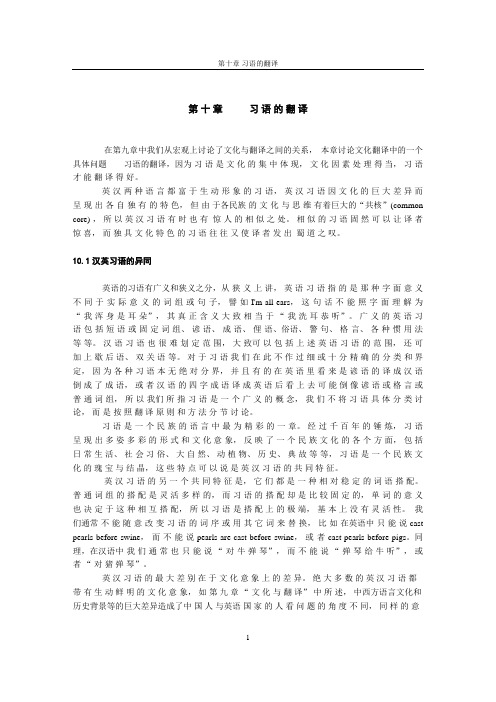
第十章习语的翻译在第九章中我们从宏观上讨论了文化与翻译之间的关系,本章讨论文化翻译中的一个具体问题——习语的翻译,因为习语是文化的集中体现,文化因素处理得当,习语才能翻译得好。
英汉两种语言都富于生动形象的习语,英汉习语因文化的巨大差异而呈现出各自独有的特色,但由于各民族的文化与思维有着巨大的“共核”(common core) ,所以英汉习语有时也有惊人的相似之处。
相似的习语固然可以让译者惊喜,而独具文化特色的习语往往又使译者发出蜀道之叹。
10.1汉英习语的异同英语的习语有广义和狭义之分,从狭义上讲,英语习语指的是那种字面意义不同于实际意义的词组或句子,譬如 I'm all ears,这句话不能照字面理解为“我浑身是耳朵”,其真正含义大致相当于“我洗耳恭听”。
广义的英语习语包括短语或固定词组、谚语、成语、俚语、俗语、警句、格言、各种惯用法等等。
汉语习语也很难划定范围,大致可以包括上述英语习语的范围,还可加上歇后语、双关语等。
对于习语我们在此不作过细或十分精确的分类和界定,因为各种习语本无绝对分界,并且有的在英语里看来是谚语的译成汉语倒成了成语,或者汉语的四字成语译成英语后看上去可能倒像谚语或格言或普通词组,所以我们所指习语是一个广义的概念,我们不将习语具体分类讨论,而是按照翻译原则和方法分节讨论。
习语是一个民族的语言中最为精彩的一章。
经过千百年的锤炼,习语呈现出多姿多彩的形式和文化意象,反映了一个民族文化的各个方面,包括日常生活、社会习俗、大自然、动植物、历史、典故等等,习语是一个民族文化的瑰宝与结晶,这些特点可以说是英汉习语的共同特征。
英汉习语的另一个共同特征是,它们都是一种相对稳定的词语搭配。
普通词组的搭配是灵活多样的,而习语的搭配却是比较固定的,单词的意义也决定于这种相互搭配,所以习语是搭配上的极端,基本上没有灵活性。
我们通常不能随意改变习语的词序或用其它词来替换,比如在英语中只能说 cast pearls before swine,而不能说 pearls are cast before swine,或者 cast pearls before pigs。
英汉翻译教程张培基【完整版】1

《英汉翻译教程》第一章 总论 翻译是运用一种语言把另一种语言所表达的思维内容准确完整地重新表达出来的语言翻译应当把原文的本意,完全正确的介绍给中国读者,使中国读者得到的概念等于英俄日德法等国的读奈达认为更准确地反映出好的翻译的实际过程是:(1)分析:从语法和语义两方面对原文的信息进行词层不对等的情况 词层不对等采取的策略 对等译法的实例 第二章 词语翻译 相关链接 family的------------------------2009年11月30日阅读 三、修辞引申 “言之无文,行之不远。
”为使译文增色,除了真实地再现原作中包含的内容外We should simplify procedures and take prompt action to import urgently needed technology ( Georges 是他的大臣Cardinal Georges )。
本例背景是美国前国务卿黑格辞职,而由 George Schu Despite their differences , their love will conquer. 尽管他们之间存在着分歧,他们的恋爱1.运用语境 这种手段主要用于语篇上找不到明显的衔接标记,但从意义上来讲是连贯统一的。
接表达出来的语言活动。
(张培基等 1983) 我国早期典籍《周礼·秋官司寇》篇里就有“象胥于英俄日德法等国的读者从原文得来的概念。
(瞿秋白:1931) “动态对等”(Dynamic Equivalence)是奈方面对原文的信息进行分析;(2)传译:译者在脑子里把经过分析的信息从原语转译成译语;(3)重新组织:把相关链接 family的译法: 原文:Do you have a family? 译文1:你有家庭吗? 译文2:你成家了吗? 辨析:现原作中包含的内容外,还得讲究修辞。
这样,在翻译时,往往因修辞需要而增添一些引申意义。
阳关雪汉译英及翻译日志
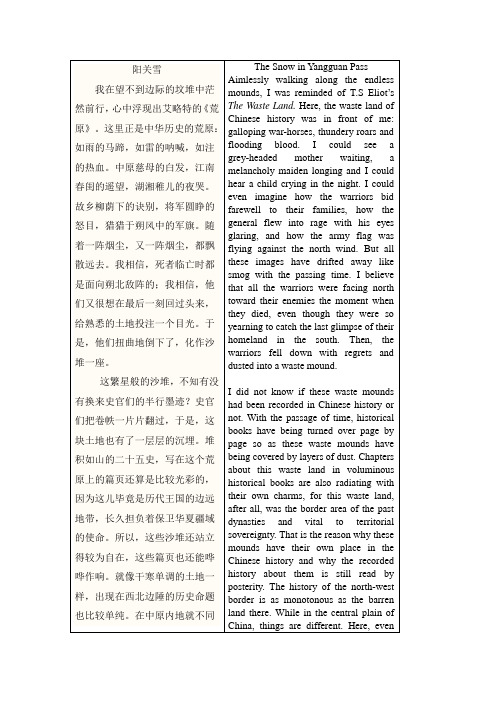
阳关雪我在望不到边际的坟堆中茫然前行,心中浮现出艾略特的《荒原》。
这里正是中华历史的荒原:如雨的马蹄,如雷的呐喊,如注的热血。
中原慈母的白发,江南春闺的遥望,湖湘稚儿的夜哭。
故乡柳荫下的诀别,将军圆睁的怒目,猎猎于朔风中的军旗。
随着一阵烟尘,又一阵烟尘,都飘散远去。
我相信,死者临亡时都是面向朔北敌阵的;我相信,他们又很想在最后一刻回过头来,给熟悉的土地投注一个目光。
于是,他们扭曲地倒下了,化作沙堆一座。
这繁星般的沙堆,不知有没有换来史官们的半行墨迹?史官们把卷帙一片片翻过,于是,这块土地也有了一层层的沉埋。
堆积如山的二十五史,写在这个荒原上的篇页还算是比较光彩的,因为这儿毕竟是历代王国的边远地带,长久担负着保卫华夏疆域的使命。
所以,这些沙堆还站立得较为自在,这些篇页也还能哗哗作响。
就像干寒单调的土地一样,出现在西北边陲的历史命题也比较单纯。
在中原内地就不同The Snow in Yangguan Pass Aimlessly walking along the endless mounds, I was reminded of T.S Eliot’s The Waste Land. Here, the waste land of Chinese history was in front of me: galloping war-horses, thundery roars and flooding blood. I could see a grey-headed mother waiting, a melancholy maiden longing and I could hear a child crying in the night. I could even imagine how the warriors bid farewell to their families, how the general flew into rage with his eyes glaring, and how the army flag was flying against the north wind. But all these images have drifted away like smog with the passing time. I believe that all the warriors were facing north toward their enemies the moment when they died, even though they were so yearning to catch the last glimpse of their homeland in the south. Then, the warriors fell down with regrets and dusted into a waste mound.I did not know if these waste mounds had been recorded in Chinese history or not. With the passage of time, historical books have being turned over page by page so as these waste mounds have being covered by layers of dust. Chapters about this waste land in voluminous historical books are also radiating with their own charms, for this waste land, after all, was the border area of the past dynasties and vital to territorial sovereignty. That is the reason why these mounds have their own place in the Chinese history and why the recorded history about them is still read by posterity. The history of the north-west border is as monotonous as the barren land there. While in the central plain of China, things are different. Here, even翻译日志原文理解原文从语言到意境都具有极强的文学性,遣词造句繁复跳跃,脱离语法的束缚。
